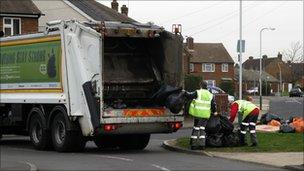Essential services strike ban 'may need to be option'
- Published

The CIPD said the government must make the case for cuts to public service workers
The government is being urged to consider banning strikes in essential public services, as a response to the expected action against coalition cuts.
Employers group, the Chartered Institute of Personnel and Development, says ministers should consider tightening laws on strike ballots.
The Trades Union Congress dismissed the idea as unworkable.
And GMB union leader Paul Kenny criticised the suggestion as an attack on the rights of employees.
Unions are preparing for a mass campaign of protest this autumn over the government spending cuts and jobs losses.
Strike action is highly likely in a number of areas of the public sector, said ҙуПуҙ«ГҪ employment correspondent Martin Shankleman.
'Case for change'
The Chartered Institute of Personnel and Development (CIPD) is urging the government to consider a range of what it calls high stake options if confronted with strikes in key industries.
These include a further tightening of the laws on strike ballots and compulsory arbitration.
But the institute said ultimately it is incumbent on the government to consider banning walk outs of workers in essential public services. It claims polls show 40% of employees back the idea.
Mike Emmott, CIPD employee relations advisor, said: "It is also incumbent on the government to consider the policy options open to it for reducing the risk of disruptive and damaging industrial action by public service employees, such as banning strike action of those involved in the delivery of essential services."
However, he added: "If the government was forced to go down this route it would be a sign of its failure to make the case for change to public sector employees."
A TUC spokesman said: "Destroying the jobs of hundreds of thousands of public sector workers will put the fragile economic recovery at risk. Of course unions will defend their members' livelihoods.
"The government would do better to invest in jobs and growth than pay attention to the CIPD's unworkable proposals on industrial action law."
Paul Kenny, GMB General Secretary said: "It beggars belief that these fat cat directors, who presided over a decade of boardroom excess and greed, have the barefaced cheek to attack the rights of people who actually work for a living."
- Published5 August 2010
- Published9 July 2010